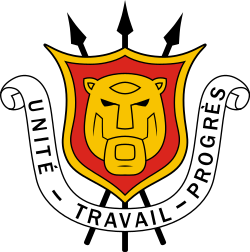 |
|---|
Burundi is divided into five provinces: Buhumuza, Bujumbura, Burunga, Butanyerera, and Gitega. [1] Prior to 2025, there were 18 provinces. [1]
 |
|---|
Burundi is divided into five provinces: Buhumuza, Bujumbura, Burunga, Butanyerera, and Gitega. [1] Prior to 2025, there were 18 provinces. [1]
The Belgian colonial administration created provinces in Burundi on September 26, 1960, to replace chiefdoms as part of a series of administrative reforms. There were 18: Bubanza, Bukirasazi, Bururi, Cankuzo, Cibitoke, Karuzi, Kayanza, Kitega, Kirundo, Makamba, Muhinga, Muramvya, Mwaro, Mwisale, Ngozi, Ruyigi, Rutana, and Usumbura. The 1962 constitution of the Kingdom of Burundi provided for eight provinces: Bubanza, Bukirasazi, Bururi, Gitega, Muramvya, Muyinga, Ngozi, and Ruyigi. [2]
In 2000, the province encompassing Bujumbura was separated into two provinces, Bujumbura Rural and Bujumbura Mairie. [3] The newest province, Rumonge, was created on 26 March 2015 from portions of Bujumbura Rural and Bururi. [4]
In July 2022, the government of Burundi announced a complete overhaul of the country's territorial subdivisions. The proposed change would reduce the amounts of provinces from 18 to 5, and reduce the amount of communes from 119 to 42. The changes were approved by both the National Assembly and the Senate and took effect in 2025 with the new parliamentary elections. [5] [6]
With the new administrative division, the country is now made up of 5 provinces : Buhumuza, Bujumbura, Burunga, Butanyerera and Gitega. These provinces are furthermore subdivided into 42 communes, 451 zones and 3044 hills (or districts) [7]

As of July 2025, Burundi has five provinces, each with its own governor. [1] [8]
| Province | Capital | Population (2024 census) | Area (km2) | Territorial correspondence with former provinces [9] | Governor as of 2025 |
|---|---|---|---|---|---|
| Buhumuza | Cankuzo | 2.052.261 | 5.931 | Cankuzo, Muyinga, Ruyigi | Dénise Ndaruhekeye |
| Bujumbura | Bujumbura | 3.353.555 | 3.937 | Bubanza, Bujumbura Mairie, Bujumbura Rural, Cibitoke, and parts of Rumonge and Muramvya | Aloys Ndayikengurukiye |
| Burunga | Makamba | 2.118.551 | 6.206 | Bururi, Makamba, Rutana, three communes in Rumonge, and the zone of Mahwa in Gitega | Parfait Mboninyibuka |
| Butanyerera | Ngozi | 2.530.206 | 4.480 | Kayanza, Kirundo, Ngozi, and parts of Muramvya | Victor Segasago |
| Gitega | Gitega | 2.278.215 | 4.546 | Gitega minus the zone of Mahwa, Karuzi, Mwaro, and parts of Muramvya | Liboire Bigirimana |

| Province | Capital | Area (km2) [10] | Population (2008 census) [11] | Density (per km2) | Communes |
|---|---|---|---|---|---|
| Bubanza | Bubanza | 1,089.04 | 338,023 | 310.4 | 5 |
| Bujumbura Mairie | Bujumbura | 86.52 | 497,166 | 5746.3 | 13 |
| Bujumbura Rural | Isale [12] | 1,059.84 | 464,818 | 438.6 | 9 |
| Bururi | Bururi | 1,644.68 | 313,102 | 190.4 | 6 |
| Cankuzo | Cankuzo | 1,964.54 | 228,873 | 116.5 | 5 |
| Cibitoke | Cibitoke | 1,635.53 | 460,435 | 281.5 | 6 |
| Gitega | Gitega | 1,978.96 | 725,223 | 366.5 | 11 |
| Karuzi | Karuzi | 1,457.40 | 436,443 | 299.5 | 7 |
| Kayanza | Kayanza | 1,233.24 | 585,412 | 474.7 | 9 |
| Kirundo | Kirundo | 1,703.34 | 628,256 | 368.8 | 7 |
| Makamba | Makamba | 1,959.60 | 430,899 | 219.9 | 6 |
| Muramvya | Muramvya | 695.52 | 292,589 | 420.7 | 5 |
| Muyinga | Muyinga | 1,836.26 | 632,409 | 344.4 | 7 |
| Mwaro | Mwaro | 839.60 | 273,143 | 325.3 | 6 |
| Ngozi | Ngozi | 1,473.86 | 660,717 | 448.3 | 9 |
| Rumonge | Rumonge | 1,079.72 | 352,026 | 326.0 | 5 |
| Rutana | Rutana | 1,959.45 | 333,510 | 170.2 | 6 |
| Ruyigi | Ruyigi | 2,338.88 | 400,530 | 171.2 | 7 |